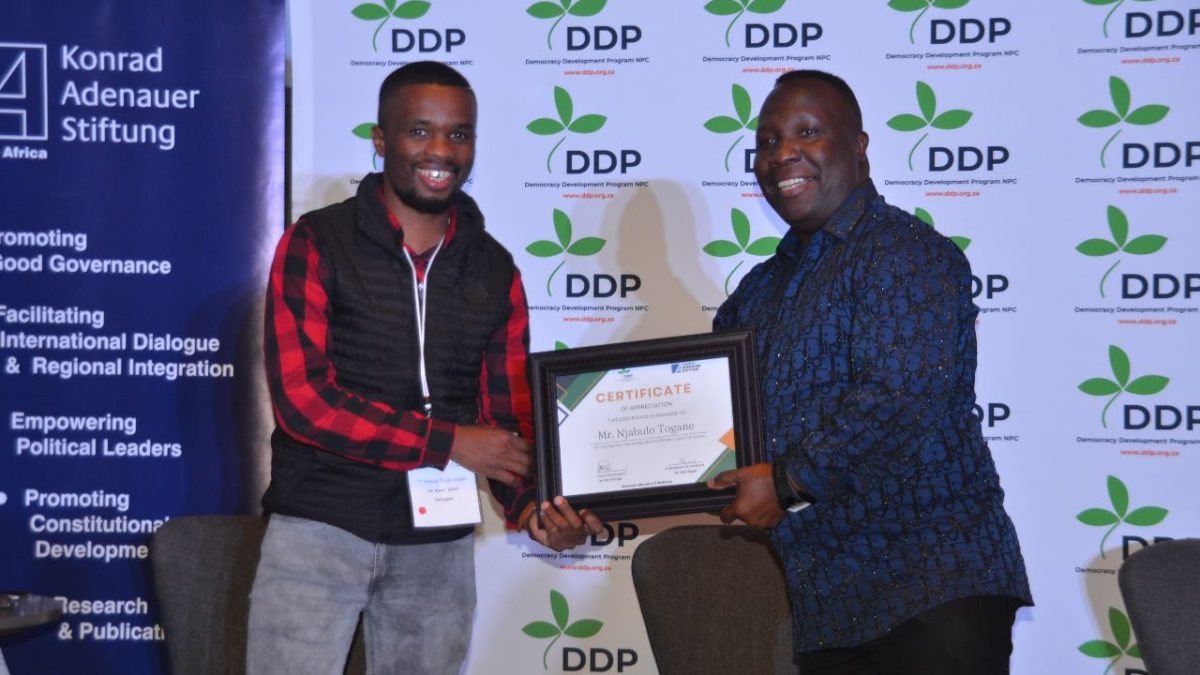7th Annual Youth Indaba: Repositioning youth political participation in advancing socioeconomic development in South Africa: Challenges and Possibilities.

On 14 June, the Democracy Development Program hosted the 7th Annual Youth Indaba. The Youth Indaba theme for this year was Repositioning youth political participation in advancing socioeconomic development in South Africa: Challenges and Possibilities.
The DDP over the years have been advancing democracy, mobilizing, educating, and activating citizens to become champions of democracy through citizens engagement and public participation in the country especially in the Province of KwaZulu-Natal. The organization for the past six years through their youth project has been leading shifts that make way for youth development, advocating and equipping young people with necessary skills to promote growth and develop their capacity to take charge of the social, political, and economic affairs of the country. Following the previous youth conference which was themed “Amplifying youth potential: promoting youth civic and political engagement”, DDP convened the 7th Annual Youth Indaba again this year. This conference converged on repositioning youth political activism, with a special focus on developing strategies that can be used to strengthen the visibility of young people in positions of power local, provincial, and national structures. It discussed strategies that can be used to advance the socioeconomic development agenda, considering the countries triple threat challenges (poverty, inequality, and unemployment) and how these are badly affecting youth development.
The room was characterised by various representatives of youth, ranging from high schoolers to leaders of youth activist organisations. The plenary discussions focused on two primary sub-themes: (1) socio-economic development, democracy and youth participation in the post pandemic era; and (2) policy shifts to support youth participation in socioeconomic development in South Africa.
The outcome of the first subtheme included an over of the current democratic dispensation, defined the current program of young people, offered steps to take to achieving a youth friendly democracy, offered direction enhancing youth participation and representation in local government and establish available public participation platforms to strengthen and safeguard the quality of democracy in South Africa. The commission explored petitions and advocacy as a tool of sustaining a prosperous, democratic, non-racial, non-sexist, and equal society. The outcome of the second subtheme was a primary focus on the role of political education and awareness, financial inclusion and digital enablement in improving youth development outcomes. It was highlighted in the room that the youth population provides a huge social, economic, and political capital required to drive socio-political and economic development. Support township and rural economies as a tool for economic transformation, job creation, and employment in high absorption capacity. This requires a new approach, one that moves away from passive citizenry towards a socially and economically inclusive society in which people are active champions of their own development, supported by an enabling environment.
Key questions which were asked in the room during the discussion included:
- How can young people be involved meaningfully in the socioeconomic development of SA in the post covid era?
- What needs to shift in different societal areas (policy, skills development, political education etc) so that young people can access socio-economic development opportunities for their own growth?
- Which participation channels can be implemented to promote youth civic and political engagement?
- What approach do we need to prioritize building a socially and economically inclusive society, in which people are active champions of their own development, supported by an enabling environment?
Some of the answers surrounding these questions emphasised the importance of understanding the current political status of young people towards active participation in the socio-economic development of South Africa and KZN. Additionally, there was consensus that more focus needs to occur on a legislative level that prioritises youth-friendly policies. Furthermore, there needs to be a plan developed to assist with cultivating a youth friendly and citizen centred democracy.
DDP extends its gratitude to the young people that attend the event; our partners for the event and the many representatives of youth advocacy organisations that were in the room.
